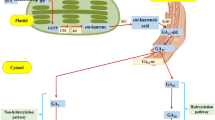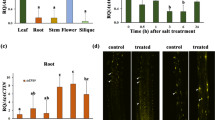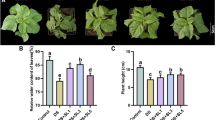Abstract
Monodehydroascorbate reductase (MDHAR), a key enzyme to reduce monodehydroascorbate (DHA) to ascorbic acid (AsA), plays an important role in maintaining the level of ascorbic acid in plant cells. It helps to remove reactive oxygen species and regulate cellular redox homeostasis. In this study, we cloned a MDHAR gene from a sugar beet M14 line (BvM14). The full-length BvM14-MDHAR was 1737 bp, and its ORF contained 1059 bp encoding the MDHAR of 352 amino acids. In addition, we expressed the coding sequence of BvM14-MDHAR in Escherichia coli and purified the BvM14-MDHAR protein with high enzymatic activity. Quantitative real-time PCR analysis revealed that the BvM14-MDHAR was up-regulated in the BvM14 roots under salt stress. To investigate the functions of the BvM14-MDHAR, it was constitutively expressed in Arabidopsis thaliana. The transgenic plants exhibited an obvious salt stress tolerance phenotype, as evidenced by longer roots, higher fresh weight and chlorophyll contents, as well as higher AsA/DHA levels than wild-type (WT) seedlings under salt stress. In addition, the overexpression seedlings showed higher activities of MDHAR and dehydroascorbate reductase (DHAR) and decreased cell membrane damage compared to WT. The results showed that the BvM14-MDHAR confers salt tolerance through its activity in redox regulation. It is a potential target for enhancing crop salt stress tolerance through genetic engineering and molecular breeding effort.







Similar content being viewed by others
Abbreviations
- MDHAR:
-
Monodehydroascorbate reductase
- DHAR:
-
Dehydroascorbate reductase
- WT:
-
Wild type
- KO:
-
Knockout
- OX:
-
Overexpression
- CO:
-
Complementation
- H2O2 :
-
Hydrogen peroxide
- MDA:
-
Malondialdehyde
- O ·−2 :
-
Superoxide radical
- ROS:
-
Reactive oxygen species
- OH·− :
-
Hydroxyl radical
- AsA:
-
Ascorbate
- GSH:
-
Glutathione
- AsA–GSH:
-
Ascorbate–glutathione
- DAB:
-
3,3′-Diaminobenzidine tetrahydrochloride
- TCA:
-
Trichloroacetic acid
References
Abouelsaad, I., D. Weihrauch, and S. Renault. 2016. Effects of salt stress on the expression of key genes related to nitrogen assimilation and transport in the roots of the cultivated tomato and its wild salt-tolerant relative. Scientia Horticulturae 211: 70–78. https://doi.org/10.1016/j.scienta.2016.08.005.
Alvarez-Gerding, X., C. Espinoza, C. Inostroza-Blancheteau, and P. Arce-Johnson. 2015. Molecular and physiological changes in response salt stress in Citrus macrophylla W plants overexpressing Arabidopsis CBF3/DREB1A. Plant Physiology and Biochemistry 92: 71–80. https://doi.org/10.1016/j.plaphy.2015.04.005.
Anjaneyulu, E., P.S. Reddy, M.S. Sunita, and B. Meriga. 2014. Salt tolerance and activity of antioxidative enzymes of transgenic finger millet overexpressing a vacuolar H+-pyrophosphatase gene (SbVPPase) from Sorghum bicolor. Journal of Plant Physiology 171: 789–798. https://doi.org/10.1016/j.jplph.2014.02.001.
Baier, M., E. Stro, and K. Dietz. 2004. The acceptor availability at photosystem I and ABA control nuclear expression of 2-Cys peroxiredoxin-A in Arabidopsis thaliana. Plant Cell Physiology 45: 997–1006. https://doi.org/10.1093/pcp/pch114.
Bent, A. 2006. Arabidopsis thaliana floral dip transformation method. Methods in Molecular Biology 343: 87–103. https://doi.org/10.1385/1-59745-130-4:87.
Chen, Z. 2003. Increasing vitamin C content of plants through enhanced ascorbate recycling. Proceeding of the National Academy of Sciences of the United States of America 100: 3525–3530. https://doi.org/10.1073/pnas.0635176100.
Chen, S., and B.A. Halkier. 1999. Functional expression and characterization of Brassica napus Myr1 myrosinase in Saccharomyces cerevisiae. Protein Expression and Purification 17: 414–420. https://doi.org/10.1006/prep.1999.1158.
Cuypers, A., J. Vangronsveld, and H. Clijsters. 2001. The redox status of plant cells (AsA and GSH) is sensitive to zinc imposed oxidative stress in roots and primary leaves of Phaseolus vulgaris. Plant Physiology and Biochemistry 39: 657–664. https://doi.org/10.1016/S0981-9428(01)01276-1.
Ding, L., and J. Zhu. 1997. Reduced Na+ uptake in the NaCl-hypersensitive sos1 mutant of Arabidopsis thaliana. Plant Physiology 113: 795–799. https://doi.org/10.1104/pp.113.3.795.
Dubey, A.K., N. Kumar, A. Kumar, M.A. Ansari, R. Ranjan, A. Gautam, N. Sahu, V. Pandey, S.K. Behera, S. Mallick, V. Pande, and I. Sanyal. 2019. Over-expression of CarMT gene modulates the physiological performance and antioxidant defense system to provide tolerance against drought stress in Arabidopsis thaliana L. Ecotoxicology and Environmental Safety 171: 54–65. https://doi.org/10.1016/j.ecoenv.2018.12.050.
Flowers, T. 1988. Chloride as a nutrient and as an osmoticum. Advances in Plant Nutrition 3: 55–78.
Flowers, T., and D. Dalmond. 1993. Protein synthesis in halophytes: the influence of potassium, sodium and magnesium in vitro. Developments in Plant and Soil Sciences 50: 195–203. https://doi.org/10.1007/BF00012008.
Garcia, V., R. Stevens, and L. Gil. 2009. An integrative genomics approach for deciphering the complex interactions between ascorbate metabolism and fruit growth and composition in tomato. Comtes Rendus Biologies 332: 1007–1021. https://doi.org/10.1016/j.crvi.2009.09.013.
Guo, D., C. Kang, L. Liu, and Y. Li. 1999. Study of apomixis in the allotriploid beet (VVC). Scientia Agricultura Sinica 32: 1–5.
Hani, A.E., A.B. Adebanjo, F. Yukichi, and E. Muneharu. 2011. Gene expression of monodehydroascorbate reductase and dehydroascorbate reductase during fruit ripening and in response to environmental stresses in acerola (Malpighia glabra). Journal of Plant Physiology 168: 619–627. https://doi.org/10.1016/j.jplph.2010.09.003.
Haroldsen, V.M., C.L. Chi-Ham, S. Kulkarni, A. Lorence, and A.B. Bennett. 2011. Constitutively expressed DHAR and MDHAR influence fruit, but not foliar ascorbate levels in tomato. Plant Physiology and Biochemistry 49: 1244–1249. https://doi.org/10.1016/j.plaphy.2011.08.003.
Horling, F., P. Lamkemeyer, and J. Konig. 2003. Divergent light-, ascorbate-, and oxidative stress-dependent regulation of expression of the peroxiredoxin gene family in Arabidopsis. Plant Physiology 131: 317–325. https://doi.org/10.1104/pp.010017.
Hyun, K.K., and H.N. Kyoung. 2016. Reverse function of ROS-induced CBL10 during salt and drought stress responses. Plant Science 243: 49–55. https://doi.org/10.1016/j.plantsci.2015.11.006.
Ji, M., K. Wang, L. Wang, S. Chen, H. Li, C. Ma., and Wang Y (2019) Overexpression of a s-adenosylmethionine decarboxylase from sugar beet m14 increased araidopsis salt tolerance. International Journal of Molecular Sciences 20(8): 1990
Jose, R., A.M. Sara, A. Gregorio, and B. Sanchez. 2014. Salts and nutrients present in regenerated waters induce changes in water relations, antioxidative metabolism, ion accumulation and restricted ion uptake in Myrtus communis L. Plants. Plant Physiology and Biochemistry 85: 41–50. https://doi.org/10.1016/j.plaphy.2014.10.009.
Kampfenkel, K., M. Vanmontagu, and D. Inzé. 1995. Extraction and determination of ascorbate and dehydroascorbate from plant tissue. Analytical Biochemistry 225: 165–167. https://doi.org/10.1006/abio.1995.1127.
Kamrun, N., H. Mirza, M.M. Alam, and F. Masayuki. 2015. Exogenous glutathione confers high temperature stress tolerance in mung bean (Vigna radiata L.) by modulating antioxidant defense and methylglyoxal detoxification system. Environmental and Experimental Botany 112: 44–54. https://doi.org/10.1016/j.envexpbot.2014.12.001.
Lai, D., Y. Mao, H. Zhou, F. Li, M. Wu, J. Zhang, Z. He, W. Cui, and Y. Xie. 2014. Endogenous hydrogen sulfide enhances salt tolerance by coupling the reestablishment of redox homeostasis and preventing salt-induced K+ loss in seedlings of Medicago sativa. Plant Science 225: 117–129. https://doi.org/10.1016/j.plantsci.2014.06.006.
Li, H., H. Cao, Y. Wang, Q. Pang, C. Ma, and S. Chen. 2009. Proteomic analysis of sugar beet apomictic monosomic addition line M14. Journal of Proteomics 73: 297–308. https://doi.org/10.1016/j.jprot.2009.09.012.
Liu, R., and H. Shi. 2014. Comparative physiological analysis of lotus (Nelumbo nucifera) cultivars in response to salt stress and cloning of NnCIPK genes. Scientia Horticulturae 173: 29–36. https://doi.org/10.1016/j.scienta.2014.04.032.
Liu, J., X. Sun, Y. Zhang, Q. Zhang, R. Miao, J. Zhang, J. Liang, and W. Xu. 2018. Suppression of OsMDHAR4 enhances heat tolerance by mediating H2O2-induced stomatal closure in rice plants. Rice 11: 38. https://doi.org/10.1186/s12284-018-0230-5.
Lv, X., J. Ying, and Y. Wang. 2018. De novo transcriptome assembly and identification of salt-responsive genes in sugar beet M14. Computational Biology and Chemistry 75: 1–10. https://doi.org/10.1016/j.compbiolchem.2018.04.014.
Ma, C., Y. Wang, Y. Wang, L. Wang, S. Chen, and H. Li. 2011. Identification of a sugar beet BvM14-MADS box gene through differential gene expression analysis of monosomic addition line M14. Journal of Plant Physiology 168: 1980–1986. https://doi.org/10.1016/j.jplph.2011.05.027.
Maksimović, J.D., J. Zhang, F. Zeng, B.D. Živanović, L. Shabala, M. Zhou, and S. Shabala. 2013. Linking oxidative and salinity stress tolerance in barley: can root antioxidant enzyme activity be used as a measure of stress tolerance. Plant and Soil 365: 141–155. https://doi.org/10.1007/s11104-012-1366-5.
Matsuda, S., H. Nagasawa, N. Yamashiro, N. Yasuno, T. Watanabe, H. Kitazawa, S. Takano, Y. Tokuji, M. Tani, I. Takamure, and K. Kato. 2014. Rice RCN1/OsABCG5 mutation alters accumulation of essential and nonessential minerals and causes a high Na+/K+ ratio, resulting in a salt-sensitive phenotype. Plant Science 224: 103–111. https://doi.org/10.1016/j.plantsci.2014.04.011.
Murashige, T., and F. Skoog. 1962. A revised medium for rapid growth and bioassays with tobacco tissue cultures. Physiologia Plantarum 15: 473–497. https://doi.org/10.1111/j.1399-3054.1962.tb08052.x.
Noctor, G., and C.H. Foyer. 1998. Ascorbate and glutathione: keeping active oxygen under control. Annual Review of Plant Physiology and Molecular Biology 49: 249–279. https://doi.org/10.1146/annurev.arplant.49.1.249.
Nublat, A., J. Desplans, F. Casse, and P. Berthomieu. 2001. Sas1, an Arabidopsis mutant overaccumulating sodium in the shoot, shows deficiency in the control of the root radial transport of sodium. Plant Cell 13: 125–137. https://doi.org/10.1105/tpc.13.1.125.
Polle, A. 2001. Dissecting the superoxide dismutase-ascorbate-glutathione-pathway in chloroplasts by metabolic modeling computer simulations as a step towards flux analysis. Plant Physiology 126: 445–462. https://doi.org/10.1104/pp.126.1.445.
Ragabi, A., Z. Ranji, Z. Griffiths, and E.S. Ober. 2007. A preliminary study on genotypic differences in transcript abundance of drought-responsive genes in sugar beet. Pakistan Journal of Biological Sciences 10: 3599–3605. https://doi.org/10.3923/pjbs.2007.3599.3605.
Ren, J., Z. Chen, W. Duan, and Y. Li. 2013. Comparison of ascorbic acid biosynthesis in different tissues of three non-heading Chinese cabbage cultivars. Plant Physiology and Biochemistry 73: 229–236. https://doi.org/10.1016/j.plaphy.2013.10.005.
Rodriguez, H.G., J. Roberts, W.R. Jordan, and M.C. Drew. 1997. Growth, water relations, and accumulation of organic and inorganic solutes in roots of maize seedlings during salt stress. Plant Physiology 113: 881–8931. https://doi.org/10.1104/pp.113.3.881.
Rosalie, R., J. Joas, and C. Deytieux-Belleau. 2015. Antioxidant and enzymatic responses to oxidative stress induced by pre-harvest water supply reduction and ripening on mango (Mangifera indica L, cv, ‘Cogshall’) in relation to carotenoid content. Journal of Plant Physiology 184: 68–78. https://doi.org/10.1016/j.jplph.2015.05.019.
Sharma, S., A. Sehrawat, and R. Deswal. 2016. Asada-Halliwell pathway maintains redox status in Dioscorea alata tuber which helps in germination. Plant Science 250: 20–29. https://doi.org/10.1016/j.plantsci.2016.05.013.
Shin, S.Y., I.S. Kim, Y.S. Kim, and H.S. Yoon. 2013. Ectopic expression of Brassica rapa L. MDHAR increased tolerance to freezing stress by enhancing antioxidant systems of host plants. South African Journal of Botany 88: 388–400. https://doi.org/10.1016/j.sajb.2013.08.015.
Song, S., X. Long, L. Liu, and Z. Liu. 2011. Effects of Na+/K+ ion distribution in various organs and photosynthetic characteristics of Catharanthus roseus at the flowering stage under salt stress. Acta Pedologica Sinica 48: 883–887.
Stevens, R., D. Page, B. Gouble, C. Garchery, and M. Causse. 2008. Tomato fruit ascorbic acid content is linked with monodehydroascorbate reductase activity and tolerance to chilling stress. Plant, Cell and Environment 31: 1086–1096. https://doi.org/10.1111/j.1365-3040.2008.01824.x.
Sultana, S., C.Y. Khew, M.M. Morshed, P. Namasivayam, S. Napis, and C.L. Ho. 2012. Overexpression of monodehydroascorbate reductase from a mangrove plant (AeMDHAR) confers salt tolerance on rice. Journal of Plant Physiology 169: 311–318. https://doi.org/10.1016/j.jplph.2011.09.004.
Sumer, A., C. Zorb, F. Yan, and S. Schubert. 2004. Evidence of Na+ toxicity for the vegetative growth of maize (Zea mays L.) during the first phase of salt stress. Journal of Applied Botany 78: 135–139.
Tester, M., and R. Davenport. 2003. Na+ tolerance and Na+ transport in higher plants. Annals of Botany 91: 503–527. https://doi.org/10.1093/aob/mcg058.
Vadassery, J., S. Tripathi, R. Prasad, A. Varma, and R. Oelmüller. 2009. Monodehydroascorbate reductase 2 and dehydroascorbate reductase 5 are crucial for a mutualistic interaction between Piriformospora indica and Arabidopsis. Journal of Plant Physiology 166: 1263–1274. https://doi.org/10.1016/j.jplph.2008.12.016.
Wakeel, A., S. Hanstein, B. Pitann, and S. Schubert. 2010. Hydrolytic and pumping activity of H+-ATPase from leaves of sugar beet (Beta vulgaris L.) as affected by salts tress. Journal of Plant Physiology 167: 725–731. https://doi.org/10.1016/j.jplph.2009.12.018.
Wang, C.F., L.L. Huang, Q.M. Buchenauer, and Z.S. Kang. 2007. Histochemical studies on the accumulation of reactive oxygen species (O2− and H2O2) in the incompatible and compatible interaction of wheat—Puccinia striiformis f. sp. Tritici. Physiological and Molecular Plant Pathology 71: 230–239. https://doi.org/10.1016/j.pmpp.2008.02.006.
Wang, Y., P. Stevanato, L. Yu, H. Zhao, X. Sun, F. Sun, J. Li, and G. Geng. 2017. The physiological and metabolic changes in sugar beet seedlings under different levels of salt stress. Journal of Plant Research 130: 1079–1093. https://doi.org/10.1007/s10265-017-0964-y.
Wang, G.L., Z.S. Xu, F. Wang, and A.S. Xiong. 2015. Regulation of ascorbic acid biosynthesis and recycling during root development in carrot (Daucus carota L.). Plant Physiology and Biochemistry 94: 10–18. https://doi.org/10.1016/j.plaphy.2015.04.014.
Wang, Y., Y. Zhan, C. Wu, S. Gong, N. Zhu, S. Chen, and H. Li. 2012. Cloning of a cystatin gene from sugar beet M14 that can enhance plant salt tolerance. Plant Science 191–192: 93–99. https://doi.org/10.1016/j.plantsci.2012.05.001.
Woo, H.A., S.H. Yim, and D.H. Shin. 2010. Inactivation of peroxiredoxin I by phosphorylation allows localized H2O2 accumulation for cell signaling. Cell 140: 517–528. https://doi.org/10.1016/j.cell.2010.01.009.
Wu, C., C. Ma, Y. Pan, and H. Li. 2013. Sugar beet M14 glyoxalase I gene can enhance plant tolerance to abiotic stresses. Journal of Plant Research 126: 415–425. https://doi.org/10.1007/s10265-012-0532-4.
Yamamoto, A., M.N. Bhuiyan, R. Waditee, Y. Tanaka, M. Esaka, K.T. Oba, A. Jagendorf, and T. Takabe. 2005. Suppressed expression of the apoplastic ascorbate oxidase gene increases salt tolerance in tobacco and Arabidopsis plants. Journal of Experimental Botany 56: 1785–1796. https://doi.org/10.1093/jxb/eri167.
Yang, L., C. Ma, L. Wang, and H. Li. 2012. Salt stress induced proteome and transcriptome changes in sugar beet monosomic addition M14. Journal of Plant Physiology 169: 839–850. https://doi.org/10.1016/j.jplph.2012.01.023.
Yu, B., J. Li, J. Koh, D. Craig, N. Yang, S. Qi, Y. Zhang, C. Ma, B. Duong, S. Chen, and H. Li. 2016. Quantitative proteomics and phosphoproteomics of sugar beet monosomic addition line M14 in response to salt stress. Journal of Proteomics 143: 286–297. https://doi.org/10.1016/j.jprot.2016.04.011.
Yu, Y., J. Wang, S. Li, X. Kakan, Y. Zhou, Y. Miao, F. Wang, H. Qin, and R. Huang. 2019. Ascorbic acid integrates the antagonistic modulation of ethylene and abscisic acid in the accumulation of reactive oxygen species. Plant Physiology 179: 1861–1875. https://doi.org/10.1104/pp.18.01250.
Zhang, X.H., R.G. Ewy, J.M. Widholm, A.R. Portis Jr., and X.H. Zhang. 2002. Complementation of the nuclear antisense rbcS-induced photosynthesis deficiency by introducing an rbcS gene into the tobacco plastid genome. Plant and Cell Physiology 43(11): 1302–1313. https://doi.org/10.1093/pcp/pcf158.
Zhang, X., H.J. Yu, X.M. Zhang, and W.J. Jiang. 2016. Effect of nitrogen deficiency on ascorbic acid biosynthesis and recycling pathway in cucumber seedlings. Plant Physiology and Biochemistry 10: 07–12. https://doi.org/10.1016/j.plaphy.2016.07.012.
Acknowledgements
The research was supported by the National Science Foundation of China (Project: 31471552\31401441\31501359\31671751), the Common College Science and Technology Innovation Team of Heilongjiang Province (Project: 2014TD004) and the National Science Foundation of Heilongjiang Province (Project: C2015026).
Author information
Authors and Affiliations
Corresponding authors
Additional information
Publisher's Note
Springer Nature remains neutral with regard to jurisdictional claims in published maps and institutional affiliations.
Rights and permissions
About this article
Cite this article
Li, J., Li, H., Yang, N. et al. Overexpression of a Monodehydroascorbate Reductase Gene from Sugar Beet M14 Increased Salt Stress Tolerance. Sugar Tech 23, 45–56 (2021). https://doi.org/10.1007/s12355-020-00877-0
Received:
Accepted:
Published:
Issue Date:
DOI: https://doi.org/10.1007/s12355-020-00877-0




